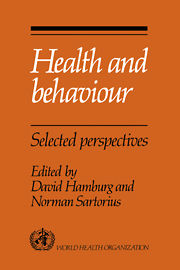Book contents
- Frontmatter
- Contents
- List of contributors
- Preface
- Acknowledgements
- List of abbreviations
- 1 Social and behavioural determinants of mental disorders
- 2 Food-related behaviour
- 3 The psychosocial environment and the development of competence in children
- 4 Children in danger
- 5 Adolescent health care and disease prevention in the Americas
- 6 Social networks and mental disorder (with special reference to the elderly)
- 7 Mental health aspects of general health care
- 8 The sociology of health care in developing countries
- 9 Population movements and health: global research needs
- 10 Health and behaviour: a worldwide perspective
- Index
3 - The psychosocial environment and the development of competence in children
Published online by Cambridge University Press: 06 August 2010
- Frontmatter
- Contents
- List of contributors
- Preface
- Acknowledgements
- List of abbreviations
- 1 Social and behavioural determinants of mental disorders
- 2 Food-related behaviour
- 3 The psychosocial environment and the development of competence in children
- 4 Children in danger
- 5 Adolescent health care and disease prevention in the Americas
- 6 Social networks and mental disorder (with special reference to the elderly)
- 7 Mental health aspects of general health care
- 8 The sociology of health care in developing countries
- 9 Population movements and health: global research needs
- 10 Health and behaviour: a worldwide perspective
- Index
Summary
Though poverty, malnutrition, and disease are responsible for developmental deficiences in many of the world's children, the psychological environment also plays an important role, and is often more manageable than the major physical problems. There is reason to believe that there is at least a moderate degree of continuity between the nature of a person's childhood environment and his or her behaviour as an adult. This continuity encompasses psychopathology, adjustment patterns, adequacy of interpersonal relationships, parenting ability, and general level of social functioning. Preventing problems in adulthood must therefore begin with helping children to cope successfully with their psychosocial environment. My focus is on that environment, on how it affects the development of competence in children and what we can do, preventively and therapeutically, to counter its ill effects and maximize those that are beneficial.
Why stress competence rather than mental health? Partly because a growing body of evidence indicates that failure to develop competence may predispose to psychopathology, rather than psychopathology lead to incompetence. Particularly relevant are studies showing a relationship between early problems in cognitive competence and later antisocial, delinquent behaviour. Another consideration is the possibility that tolerance of individual deviation stemming from mental disorder may be greater if the ‘deviant’ has specific skills (competences) that are valued by society. It has been found, for example, that training problem children in specific social skills has resulted in their being better accepted by their peers and teachers – even though the children's problem behaviours may not have changed.
Keywords
Information
- Type
- Chapter
- Information
- Health and BehaviourSelected Perspectives, pp. 65 - 106Publisher: Cambridge University PressPrint publication year: 1989
